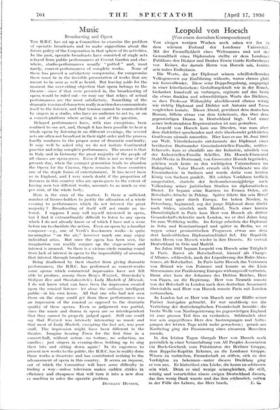Music
Broadcasting and Opera THE B.B.C. has set up a Committee to examine the problem of operatic broadcasts and to make suggestions about the future policy of the Corporation in that sphere of its activities. In the past, operatic broadcasts have consisted of single acts relayed from public performances at Covent Garden and else- where, studio-performances usually " potted " and, most rarely, concert-performances of complete works. None of these has proved a satisfactory compromise, for compromise there must be in the invisible presentation of works that are vacant to be seen as well as heard. But leaving aside for the moment the over-riding objection that opera belongs to the theatre—since if that were persisted in, the broadcasting of opera would be ruled out—we may say that relays of actual performances are the most satisfactory. Something of the dramatic tension of characters really in action does communicate itself to the listener, and that tension cannot be counterfeited by singers in a studio, who have no audience to act to, or on a concert-platform where acting is out of the question.
Relayed performances have, with rare exceptions, been confined to one act, and, though it has been possible to hear a whole opera by listening-in on different evenings, the several acts are often not broadcast in their right order and the procesS hardly conduces to the proper sense of dramatic continuity. It may well he asked why we do not imitate Continental practice and relay complete performances. The answer is that in Italy and in Germany the great majority of the people of all classes are opera-goers. Even if this is not so true of the present day, when the younger generation tends to abandon the Opera for the Cinema, Opera remains in those countries one of the staple forms of entertainment. It has never been so in England, and I very much doubt if the proportion of listeners in this country who are opera-goers to the extent of having seen ten different works, amounts to as much as one per cent. of the whole body.
Here is the crux of the matter. Is there a sufficient number of licence-holders to justify the allocation of a whole evening to performances which do not interest the great majority t Broadcasting of itself will not create an in- terest. I suppose I may call myself interested in opera, but I find it extraordinarily difficult to listen to any opera which I do not already know or of which I have not a score before me to elucidate the action. Even an opera by a familiar composer—e.g., one of Verdi's less-known works—is quite meaningless " on the air," however much one may enjoy individual arias. But once the opera has been seen, the imagination can readily conjure up the stage-action and interest is aroused. So there is a vicious circle running round from lack of interest in opera to the impossibility of arousing that interest through broadcasting.
Being disallowed by their charter from giving dramatic performances, the B.B.C. has performed as concert-works some operas which commercial impresarios have not felt able to produce, among them Berg's Wozzeek, Stravinsky's Oedipus Rea and Shostakovitch's Lady Macbeth of Misenek. I do not know what can have been the impression created upon the musical listener—let alone the ordinary intelligent public—in his own home. All that one who had not seen them on the stage could get from these performances was an impression of the musical as opposed to the dramatic quality of these operas. Even so judgement was partial, since the music and drama in opera are so interdependent that they cannot be properly judged apart. Still one could say that Wo=eck was intensely interesting as music and that most of Lady Macbeth, excepting the last act, was poor stuff. The impression might have been different in the theatre. Imagine hearing Tosca for the first time in a concert-hall, without action—no torture, no seduction, no candles ; just singers. in evening-dress bobbing up to sing their bits and sitting down again ! In its eagerness to present new works to the public, the B.B.C. has in reality done those works a disservice and has contributed nothing to the advancement of opera in this country. It seems an impasse, out of which the Committee will have some difficulty in finding a way—unless television makes sudden strides in • efficiency and cheapness that will turn it into a new dens cx machina to solve the operatic problem.
DYNELEY HUSSEY.












































 Previous page
Previous page